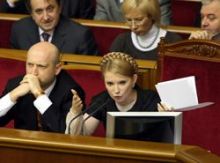The IMF pulled off a virtually impossible trick by reconciling the president of Ukraine and the prime minister-at least for a while. During the first half of Thursday, Oct. 30, 2008, Ukrainian politicians demonstrated their miraculous ability to reach an understanding.
Yulia Tymoshenko revoked “with pleasure” her bill in favor of the president’s “abridged” bill, as a result of which Ukraine may get a $16.5-billion loan from the IMF. The bill was voted through by 248 MPs, including 156 BYut members, 72 NU-NS MPs, 18 parliamentarians from Volodymyr Lytvyn’s faction, and two “regionals.” The communists abstained.
Clearly, it was the basic instinct of self-preservation instinct that worked the miracle here. Volodymyr Stelmakh, the head of Ukraine’s National Bank, said point-blank that without the IMF loan Ukraine will be in troubled waters-in fact, on the verge of default. Over the past couple of months the hryvnia has fallen to UAH 6.225 to 1 US dollar on the interbank currency market.
Ukraine needs this loan as a stabilizing cushion for the country’s financial sector. Ambitions and political games are out of the question.
“We are not rolling in clover; we would be happy just to stay afloat. Thankfully, there is an understanding of how urgent the economic situation is,” said political scientist Volodymyr Fesenko in an interview published in The Day.
“Above all, we have to adopt measures on the economy. Of course, this is a clear concession on Tymoshenko’s part. However, I would not overemphasize the authorship of the bill. This is not very important to voters, nor does it matter that much to large businesses. What is important to them is the quick adoption of the bill; everything else is secondary. So I would not exaggerate the ‘propaganda’ effect of this law,” Fesenko said.
In contrast, other bills did not go down so easily. Parliament did not pass the bill to finance the early election; it got a mere 222 votes. Meanwhile, the BYuT and NU-NS factions managed to get into a fight.
The conflict erupted when a NU-NS member accused parliamentarians from the BYuT of confiscating Oksana Bilozir’s card. The BYuts responded by asking whether they could spot Bilozir in the session room and why Sviatoslav Vakarchuk’s card was still being used to vote over a month after he resigned his parliamentary seat. Then some BYuT members encircled their colleagues from the NU-NS faction, preventing them from voting with cards that did not belong to them. This resulted in a no-pass vote.
The same fate befell Olena Lukash’s bill. There was even an element of mystery, as the same number 222 flashed on the screen. During the discussion stage the communists, BYuT, and NU-NS criticized the bill as being conducive to election fraud. The Verkhovna Rada’s special committee did not support the bill either.
The parliamentary show continued with the second reading of certain bills.
HOW THE UKRAINIAN ECONOMY WILL BE “SAVED”
1. A stabilization fund is being set up, to which contributions are to come from privatization, unplanned revenues, and bond floating. However, Mykola Azarov (Party of Regions) warned that the first two contribution sources are not to be expected in the immediate future. The first hryvnia from privatization will come in six months at the earliest.
2. The bill also authorizes the Ministry of Finance to take out domestic loans in foreign currency.
3. The bill also includes proposals to ban banks from distributing their net profits and paying dividends until 2011 if they violate the regulations, as well as to institute a special procedure for the National Bank’s appointment of interim administrations in problem banks and the government’s involvement in the formation and increase of their authorized capital.
4. The president also included norms to allow the 2008 government to purchase banks’ shares in exchange for government bonds or other loans and extra income, with the state loan modified correspondingly.
5. Under the provisions included in the bill, the state authorizes the state-owned Ukreksimbank to purchase one billion hryvnias’ worth of Prominvestbank shares.
6. The president’s bill states that in 2008 the government will guarantee loans from international financial organizations (IFOs) to the tune of 40 billion hryvnias and obtain IFO loans to implement socioeconomic projects worth up to 10 billion hryvnias.
7. Yushchenko’s bill also entails the deferment from Jan. 1, 2009, to Jan. 1, 2011, of the introduction of the minimum wage equal to the subsistence level and a special advantageous VAT tax rate for agricultural producers. This is one of the “odiose” norms against which the Lytvyn faction protested so vehemently. The president’s representative explained: “Let us honestly tell our citizens, including government employees, for these two years that we can raise the subsistence level and the minimum wage to the level of inflation, i.e., keep their real level accounting for inflation. We cannot do more than that in these two years.”
8. Finally, the presidential bill does not contain the draconian norm (which the government bill does) allowing banks, for example, to confiscate a mortgaged apartment if payment installments are the slightest bit in arrears.







